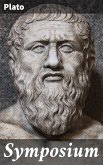In "The Symposium," Xenophon presents a fascinating dialogue centered around themes of love, virtue, and the nature of happiness, echoing the intellectual spirit of classical Athens. Structured as a series of conversations among notable figures, the text employs a Socratic dialogue style that compels readers to engage deeply with the philosophical underpinnings of social relationships and ethical conduct. Rich in rhetoric and reflecting the cultural milieu of the 4th century BCE, Xenophon'Äôs work offers an alternative perspective to Plato's Symposium, emphasizing practical wisdom and everyday virtue alongside idealistic views. Xenophon, an Athenian historian, philosopher, and soldier, was significantly influenced by his experiences in both Greek warfare and Socratic thought. Having been a student of Socrates, his writings often reflect the philosophical inquiries of his mentor while making them accessible to a broader audience. His unique position as a citizen of Athens, intertwined with military leadership and intricate social networks, shaped his examination of human relationships and moral philosophy, giving "The Symposium" a pragmatic lens through which to view love and companionship. This work stands as an essential read for those interested in classical philosophy and the evolution of social thought. Readers will appreciate not only the depth of intellect and clarity of expression but also the enduring relevance of the questions posed regarding love and morality in contemporary society.
Dieser Download kann aus rechtlichen Gründen nur mit Rechnungsadresse in A, B, BG, CY, CZ, D, DK, EW, E, FIN, F, GR, H, IRL, I, LT, L, LR, M, NL, PL, P, R, S, SLO, SK ausgeliefert werden.









